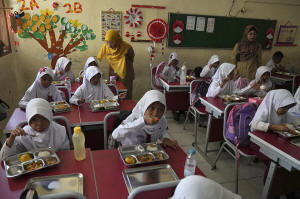Indonesia launches free meals program to feed children and pregnant
women to fight malnutrition
 Send a link to a friend
Send a link to a friend
 [January 06, 2025]
By NINIEK KARMINI and DITA ALANGKARA [January 06, 2025]
By NINIEK KARMINI and DITA ALANGKARA
JAKARTA, Indonesia (AP) — Indonesia's new government started an
ambitious project on Monday to fight malnutrition by feeding nearly 90
million children and pregnant women that is expected to cost $28 billion
through 2029, although critics question whether the program is
affordable.
The Free Nutritious Meal program delivers on a campaign promise by
President Prabowo Subianto, who was elected last year to lead the
nation, which has more than 282 million people and Southeast Asia's
largest economy. He said the program aims to fight the stunting of
growth that afflicts 21.5% of Indonesian children younger than 5 and
would raise the income of farmers.
Subianto has pledged to accelerate GDP growth to 8% from 5% now.
In his inauguration speech in October, Subianto said many children are
malnourished. His promise to provide free school lunches and milk to 83
million students at more than 400,000 schools is part of a longer-term
strategy to develop the nation’s human resources to achieve a “Golden
Indonesia” generation by 2045.
“Too many of our brothers and sisters are below the poverty line, too
many of our children go to school without breakfast and do not have
clothes for school,” Subianto said.

Subianto’s signature program could cost upward of 450 trillion rupiah
($28 billion) by the end of his term in 2029. He said his team has made
the calculations to run such a program, and “We are capable.”
The government's target is to reach an initial 19.5 million
schoolchildren and pregnant women in 2025 with a budget of 71 trillion
rupiah ($4.3 billion) so as to keep the annual deficit under a
legislated ceiling of 3% of GDP, said Dadan Hindayana, the head of the
newly formed National Nutrition Agency.
Hindayana said the money would buy an estimated 6.7 million tons of
rice, 1.2 million tons of chicken, 500,000 tons of beef, 1 million tons
of fish, vegetable and fruit, and 4 million kiloliters of milk.
Nearly 2,000 cooperatives will be involved in the free meals program by
providing eggs, vegetables, rice, fish, meat, milk and other food,
Cooperative Minister Budi Arie Setiadi said.
On Monday, a truck carrying food arrived at SD Cilangkap 08, a primary
school in the Jakarta satellite city of Depok. The 740 students were
provided rice, stir-fried vegetables, tempeh, stir-fried chicken and
oranges.
[to top of second column]
|

Students have their meals during the kick off of President Prabowo
Subianto's ambitious free meal program to feed children and pregnant
women nationwide despite critics saying that its required logistics
could hurt Indonesia's state finances and economy, at an elementary
school in Depok, West Java, Indonesia, Monday, Jan. 6, 2025. (AP
Photo/Dita Alangkara)
 “We will send a team to each school
to facilitate the meal distribution to students every day,”
Hindayana said, adding that the program will provide one meal per
day for each student from early childhood education to senior high
school, covering a third of the daily caloric needs for children,
with the government providing the meals at no cost to recipients.
But the program has drawn criticism from investors and analysts over
the scale of its logistics, the burden on state finances and the
economy, and its relation to the interests of industrial lobby
groups.
Nailul Huda, a researcher at the Center of Economic and Law Studies,
said Indonesia’s state finances are not strong enough to support the
program and this will lead to additional national debt.
“The burden on our state budget is too heavy if it is forced to
reach 100% of the target recipients, and it will be difficult for
Prabowo’s government to achieve the economic growth target of 8%,”
Huda said.
He warned it could also worsen the external balance of payments for
the country, which is already a major importer of rice, wheat,
soybeans, beef and dairy products.
Reni Suwarso, the director of Institute for Democracy, Security and
Strategic Studies, said the decline in the stunting rate in
Indonesia was far from the target of a 14% reduction in 2024.
According to the 2023 Indonesian Health Survey, the national
stunting prevalence was 21.5%, down around 0.8% from the previous
year. The United Nations Children’s Fund estimated that one in 12
Indonesian children younger than 5 suffers from low weight while one
in five is shorter than normal. Both conditions are caused by
malnourishment.
“That’s so bad and must be solved,” Suwarso said. “Child
malnourishment has severe consequences, threatening the health and
long-term development of infants and young children throughout this
nation.”
All contents © copyright 2024 Associated Press. All rights reserved |